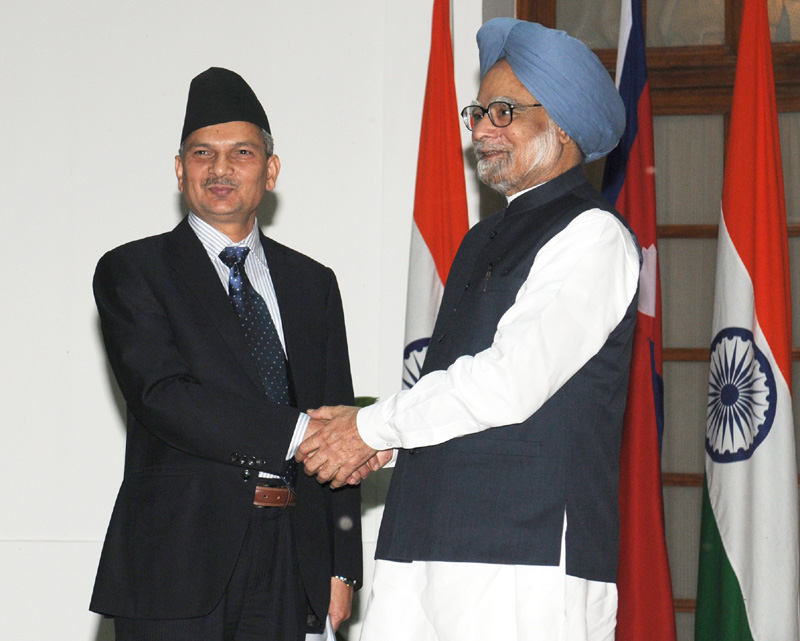
New Delhi: In key initiatives that are set to bolster ties between New Delhi and Kathmandu, India Friday unveiled a $250 million line of credit and sealed a bilateral investment protection pact that would act as a catalyst in promoting economic ties.
Prime Minister Manmohan Singh held wide-ranging discussions with his Nepalese counterpart Baburam Bhattarai on a host of bilateral issues, including expanding economic and security ties between the two countries. Bhattarai updated Manmohan Singh about recent political developments in his country and sought New Delhi’s support in reinvigorating the peace process in his country that continues to be bogged down with political dissensions, said well-placed sources.
He also briefed New Delhi about progress in the integration and rehabilitation of the Maoist cadres in the national army. Manmohan Singh assured the Maoist leader that New Delhi will do all it can to spur the peace process in the Himalayan country and pushed for building political consensus to quicken the process of constitution making, said sources.
In an important step that underlines New Delhi’s keen desire to build relations with the Maoist dispensation in Kathmandu, marking a return to “business as usual” in bilateral ties, India offered a $250 million line of credit that would be used for a swathe of development projects in that country.
The agreement on soft loans was signed by T.C.A. Rangathan, executive director of EXIM Bank and Lal Shanker Ghimire, joint secretary in Nepal’s Ministry of Finance.
The credit line will be used to finance a range of infrastructure projects, including highways, airports, bridges, irrigation, roads, railways and hydropower projects. The soft loan will carry a concessional interest rate of 1.75 per cent per annum, with repayment over 20 years, inclusive of a 5-year moratorium.
In a breakthrough, Kathmandu finally agreed to address the security worries of Indian investors and went ahead with the signing of a long-overdue Bilateral Investment Promotion Agreement. The agreement was signed by Finance Minister Pranab Mukherjee and Nepal’s Industry Minister Anil Kumar Jha.
Significantly, the treaty accommodates the long-standing Indian demand and entails granting compensation to the investors whose investments suffer losses owing to war, armed conflict or a state of national emergency. The agreement also provides that nationalisation or expropriation of investments shall not be resorted to except in public interest and in accordance with law on a non-discriminatory basis and against fair and equitable compensation.
The pact provides for free repatriation of funds of an investor of either country, clearing the decks for a quantum jump in trade and investment between the two neighbours.
Significantly, the treaty regards investment to include every kind of asset like intellectual property rights in accordance with laws and regulations of the country in which the investment is made. The basic principles of Most Favoured Nation Treatment and National Treatment have been woven in the agreement.
The treaty has an added importance in view of anxiety among Indian entrepreneurs after the attack on 900 MW Upper Karnali hydropower project an

Indian company was building in Nepal by suspected Maoist cadres a few months ago.
A memorandum of understanding between the two governments regarding Indian grant assistance for Goitre Control Programme in Nepal was also inked. Under this pact, India will provide Rs.1.875 crore to Nepal for the control of goitre and other iodine deficiency diseases in that country.
Bhattarai, who studied at Jawaharlal Nehru University, began his maiden visit to India as the prime minister Thursday on a positive note by stressing the fates of the two countries are interlinked and called for for unity between the people of India and Nepal. “We have to unite. Some will try to create a cleavage between us. If people of the two countries unite, no force on earth can defeat them,” he said here amidst worries in some sections in Delhi about the Maoists’ tilt towards Beijing.
IANS
The opinions, beliefs and viewpoints expressed by authors, news service providers on this page do not necessarily reflect the opinions, beliefs and viewpoints of Hill Post. Any views or opinions are not intended to malign any religion, ethnic group, club, organization, company, or individual.
Hill Post makes no representations as to the accuracy or completeness of any information on this site page.



